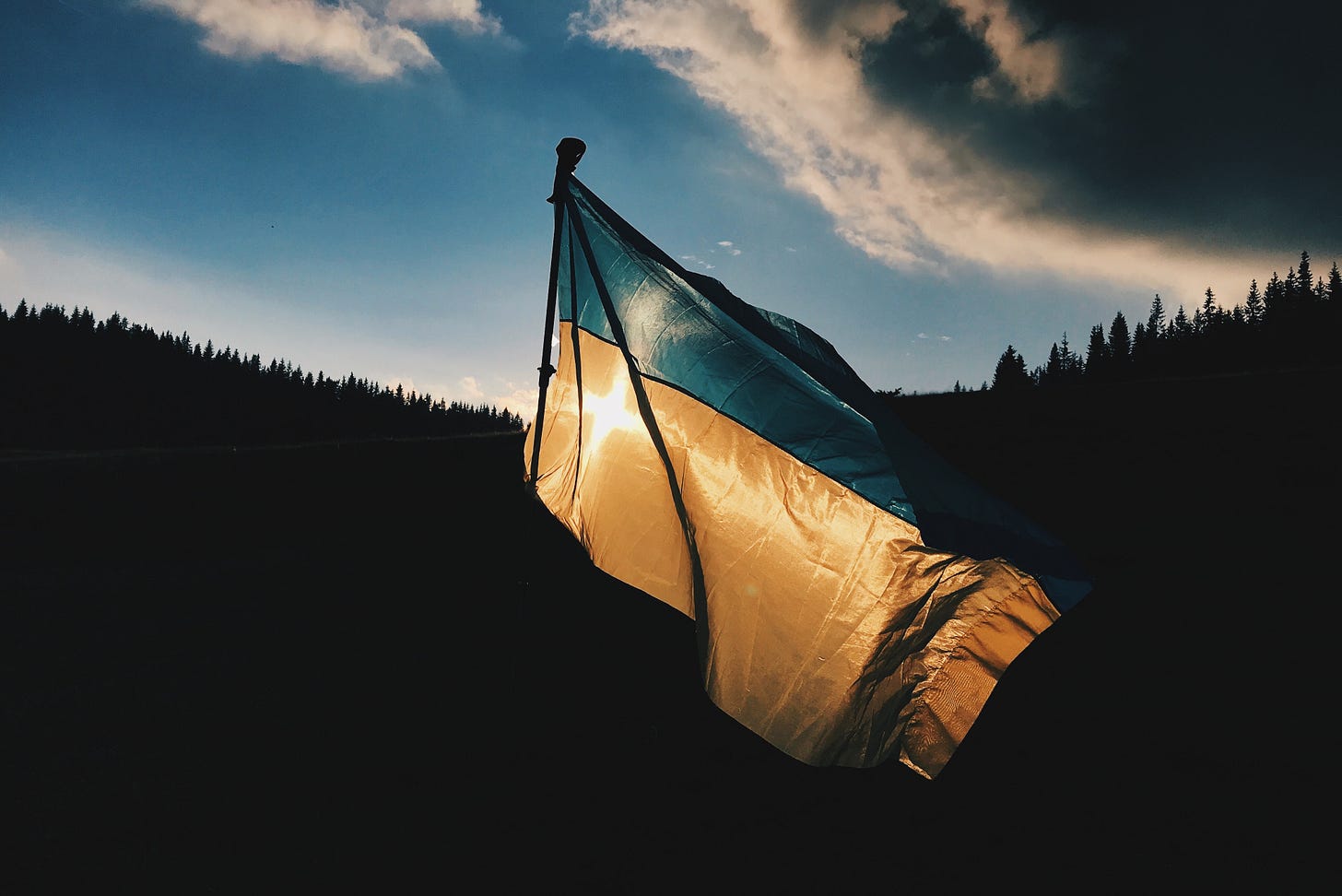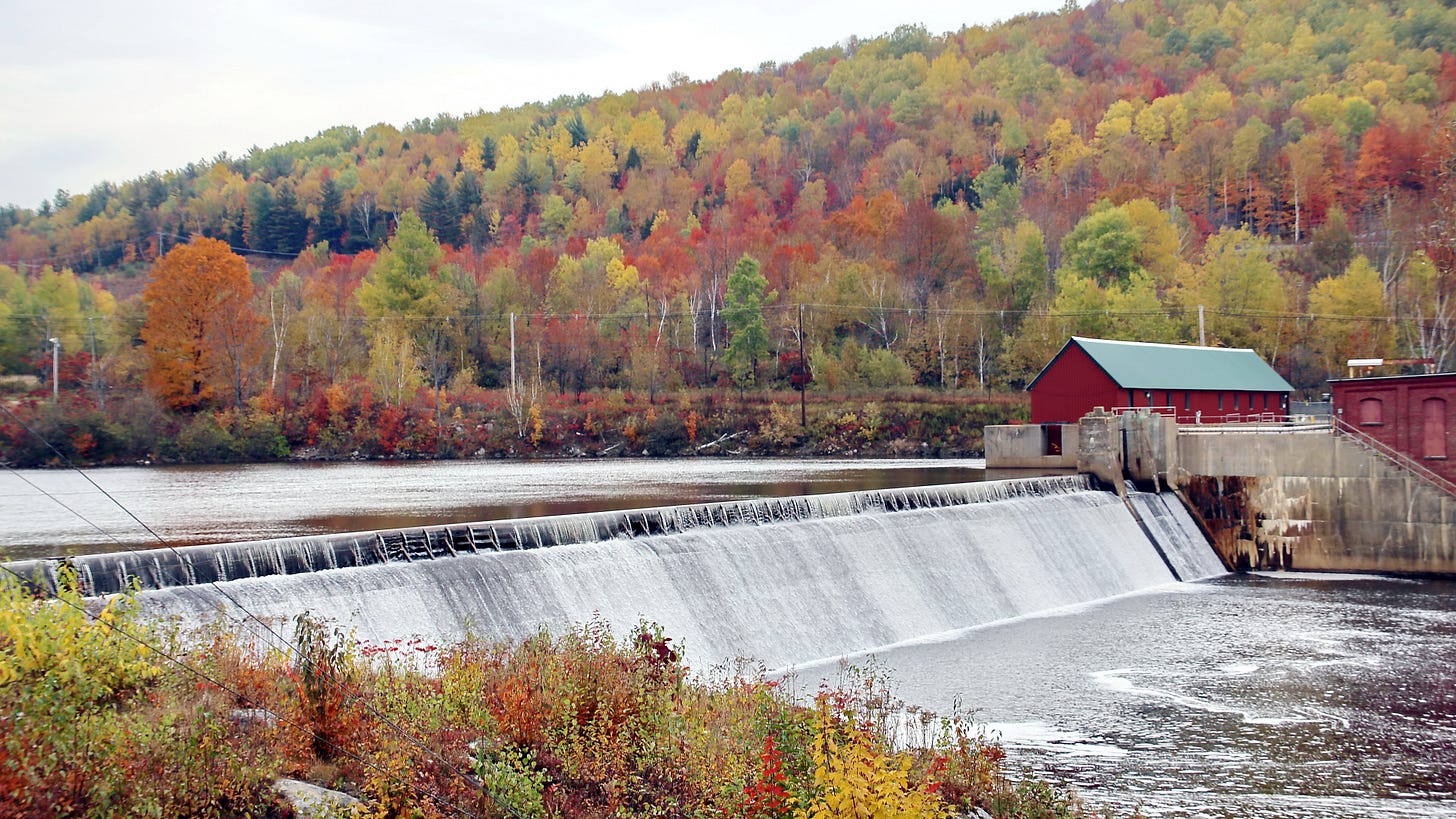The Weekly Distillation No.61
Ukraine; Future of Work; Web3; DAOs; Polarisation; Drinks; Climate; Questions

This newsletter is written for entrepreneurial leaders who want to learn about the moment we are living in but don’t have time to read broadly; who want to grasp the key themes; and who want to create better ways of advancing their mission. The Weekly Distillation covers a broad range of topics with the intent to curate the key narratives of the week, how they fit the broader themes of society and to pose questions that help you to think deeper on the application in your context. You can read more about the key themes I see here.
People once said……..
“Preserved in discrete human inheritances—arts, literature, music, architecture, history, law, religion—culture expands the human experience of time, making both the past and the future present to creatures who otherwise experience only the present moment.” - Patrick J. Deneen, Why Liberalism Failed
“As of this moment, I’m convinced he’s made the decision,” - US President Biden

For all we knock the Russian military, you have to admit their social media feeds are quite funny.

“You can't be a real country unless you have a beer and an airline. It helps if you have some kind of a football team, or some nuclear weapons, but at the very least you need a beer.” - Frank Zappa
Skim it in a minute
Theme: Geopolitical tensions are rising
The week passed without an(other) invasion of Ukraine by Russia. The US now seems convinced war is imminent, and without being cynical about US politics, it seems extremely likely now that we are days away from the biggest land war that Europe has seen since my grandfather was blowing up German airfields on the Greek Islands. I talked to one founder this week who told me he and his friends have been discussing if they would become conscientious objectors if they got called up. We’re a long way from that - or are we?
WW1 went from a nationalist shooting an Archduke to the worst war within a short period. WW2 was a slower start but involved creeping expansionism by Nazi-led Germany and led to the red line of Poland being the decision point for the UK to enter a war that lasted almost 6 years. Desert Storm (Iraq 1) started from Iraq invading Kuwait (not a member of NATO last time I checked). The Falklands War was from Argentina invading the Falkland Islands. Vietnam was a long and creeping insurgency, backed by external powers. The Long War of the last 20 years was triggered by a horrific event (and then unrelated opportunism in Iraq). If we learn anything from these (beyond that war is horrific and should be avoided), it’s that the aggressor has no idea what they are walking into and are making a bargain that they can get away with it.
It appears that Putin has stared down the West and said ‘I see your sanctions threats and your welly boots you’ve sent Ukraine to fight in but it’s still worth it.’ We’re still playing a different game - Putin is in it for Nationalism and we’re offering missile talks.
So what next and what’s the relevance for you? If there is war, and as projected it involves taking Kyiv, then an insurgency backed by the West seems likely. Cyber attacks on the West seem a near-certainty. Volatility in markets, extended supply chains, disrupted travel plans, sanctions and lots of noise.
What does it mean to think deeper? If we have a world of greater conflict and uncertainty in the next decade, how do you and your organisation thrive? How do you survive if the internet was not available for an extended period? How aligned is your organisation’s younger workers attitude to war? Where do you land on the morality and ethics of AI and Drone swarms in warfare? How exposed are you to rising Government debt levels? Does this mean lower rates and higher inflation? How do you protect yourself?
Theme: Technology is changing the future of work

Travelling on the bus or tram to work in the last few weeks has shown that in my city offices are nowhere near back to normality. People are still averse to sitting next to someone on a bus (an illogical stance) and therefore capacity is c.40% of what it was previously. Sandwich shops, streets and bars are at a fraction of pre-Covid occupancy. Managers are accepting the reality of hybrid work - but more than partially because the workforce is flat-out refusing to return full time. In the Biz Dev side of my roles, I have seen massive benefit from getting to see people in person again - but it is perfectly possible to do this by Zoom also. The new stance is an initial call, and then a greater effort previously to go and see people in person. I’m not seeing a rise in the work-from-anywhere approach yet - but that’s a function of the industry and culture I live in I suspect. Compliance manuals, HR policies, health and safety policies - these all feel woefully out of date for the current realities.
The Web3 world remains a fascinating mix of crime, scams, hype, losses, gains, invention and creativity extreme. The Wild West is a good analogy. Tread carefully. A hard fork is needed to rescue $33bn of ETH. Ouch. Biden is coming with a demand to put in place a regulatory landscape. Meanwhile, the Marshall Islands is going for a landgrab with an intent to be the first nation where you can legally domicile DAOs (effectively looking to become the Delaware of DAOs).
Meanwhile, in the metaverse, Facebook (sorry, Meta) stated its employees would now be known as Metamates. Wonder how that will go in its Australian offices (g’day Metamate mate) or Glasgow (alright mate, my Metamate, see ya later mate). Chinese cities are going into the metaverse as part of planning new cities - even though, like the rest of us, don’t know what it means. JP Morgan opened up a bank branch in the metaverse - imagine your job was a bank teller in the metaverse. Please save me from that.
Packy, who is a great read, posted a thread with some great links to Tokenomics. (Nb this is separate from another helpful subject of ‘Tokenization’. For a 101 on Tokenomics, read this.

The NYSE wants to be a place to trade cryptocurrencies and NFTs. Whether this happens or not will also depend on the Biden point above. An analysis of the market cap of Ethereum.
I’m still most enthused about DAOs, albeit they are very early on the hype cycle. Could DAOs be the new LLCs? Andreesen Horowitz believes that the future of work is DAOs & crypto networks. In essence - DAOs replace companies, you become a freelancer and provide your services on contract to the DAOs. The critique might be how you create this without ending up with the curse of the gig economy - high uncertainty, exploitative employers and wages pushed down the lowest the market will bear.
How are you enabling or encouraging work from anywhere? How can more flexible employment contracts help you upskill and upgrade your team? Where can it help you bring in greater diversity? Could you add new members to the Board that you never could have before? What does your organisation look like as a DAO? Should you be in the Metaverse? What happens to your organisation if the leadership holds no power, the means of transaction are all crypto and proof of employment is an NFT?
Theme: Technology as the solution to the Climate Crisis

I thought about introducing a section of the newsletter that was “silliest idea of the week” but decided not to - albeit these two developments did cause me to question that approach. There is a lot of focus on using alternative sources of energy and also in shifting the demand cycle (recycle, reuse, reduce) but it’s likely that the biggest impact on climate over time will be new technologies. To that end, nuclear fusion (as mentioned last week) is fascinating but perhaps letting a power stronger than the sun be controlled by a DeepMind AI is not the best approach. On the other hand, some clever entrepreneurs believe that drilling into the middle of Earth is a cunning plan. I wonder if they ever saw that old movie, Volcano.
How much of your leadership should be spent on climate matters? What technology could you leverage? Where can you reduce, reuse, recycle? If you were being honest with yourself, how much are you ‘greenwashing’ your existing behaviours? What would it take to be the no.1 leader on this in your industry? How much attention are you giving to alternative views and is there any merit in the latest arguments of climate sceptics? If you thought climate change was going to happen, to the worst scenario possible, regardless of what we do, how would your leadership and strategy change?
Theme: Media is fragmenting, polarising and populist

There’s no doubt that the media we read shapes our worldviews. There’s been a drop in the quality of mainstream journalism, as it responds to live updates, TikTok length videos and greater demand for stories to feed algorithms (which leads to populist content as this drives page views which equals the key advertising metric). This story on the BBC on the upcoming Gender Reform Act in Scotland was a case in point. We’re not getting into transgenderism on here, I don’t have enough word count left.
The BBC reports the story without a counterpoint of view (which it usually does on matters where it believes there is no valid opposing view - e.g. vaccines, climate change). And yet the poll it reports on indicates 1/3rd in favour (roughly), 1/3rd against (roughly) and 1/3rd who don’t know or care. It would be fascinating to hear from the don’t knows/don’t cares. It would be important to hear about the tragedy of the 9 in 10 young trans teens (source: Stonewall) who have thought about suicide. It would be important to hear from parents who have views on whether it is a child’s ‘right’ to choose a gender. It would be fascinating to hear about whether this will split the SNP and strengthen the Union as people abandon the SNP (or will they flock to the SNP). It felt like surface-level journalism on a very very complex issue.
Where do you go for news when the mainstream journalists are driving for page views and competing with TikTok? How much are you exposing yourself to the opposite view (as a starting point for a dialogue)? What are the questions that the media is not asking that you wished they had covered? How can you bring a greater discussion to the workplace? What does it look like to model dialogue with people you don’t agree with? How can you convene broader discussions?
Theme: Rapid changes in what we eat and drink

As drinkers continue to seek story, authenticity, provenance, originality and quality in their drinks, a couple of stories caught my eye this week. A new distillery on Islay was the 6th planned new distillery I heard of this week (not counting the two in Campbeltown which I had known of for a few months). Before 2000 there was.104 distilleries active in Scotland. 36 have been opened since 2000. I have a list of 46 still planned to be opened. This trend is happening in every drinks category out there and is probably reflected in what your drinks selection at home looks like. This s fascinating and there are some great entrepreneurial ventures out there - but it begs the obvious question. How are you going to get your customer to know about and choose your product over this level of competing brands?
Respect for Stauning in Denmark who tried to exacerbate the story I wrote of a few weeks ago, of the uninhabited island that is a point of dispute between Canada and Denmark. The Danish distiller is now threatening to stop (note: not actually stopping) distilling until the issue is resolved. Way to go to get the headlines by trying to kick off a real-life war. Good marketing though.
How much is your route to market now changing with the fragmentation in every product based industry? If there are no truly sustainable unique selling propositions anymore, is there are any alternative strategy to just premiumising your product range? If capital availability dries up (war, quantitative tightening, economic cycles, China etc) how would your organisation survive? What does it look like to create a product that does good, not just talks about doing good? What is the disruption of a BCorp? What is ‘good’ anyway?
Thanks for reading. Last week’s newsletter received 349 views with a 66% open rate and the number of subscribers is now at 216. I’m off to watch Hearts play St Johnstone away (thankfully the pitch just passed an inspection post the storms of this week) in Perth, which should lead to an improved standing on the Fanhub leaderboard and more crypto tokens. And hopefully 3 points. From war to crypto, these are the times we live in. Have a great weekend.




